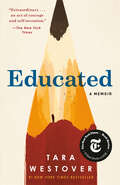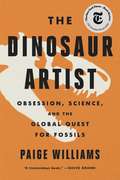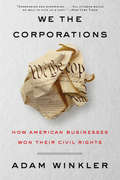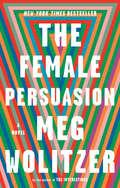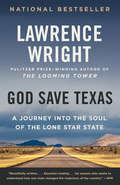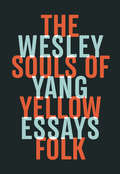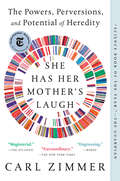Special Collections
100 Notable Books of 2018
- Table View
- List View
Educated
by Tara WestoverAn unforgettable memoir about a young girl who, kept out of school, leaves her survivalist family and goes on to earn a PhD from Cambridge University.
Tara Westover was seventeen the first time she set foot in a classroom. Born to survivalists in the mountains of Idaho, she prepared for the end of the world by stockpiling home-canned peaches and sleeping with her “head-for-the-hills” bag. In the summer she stewed herbs for her mother, a midwife and healer, and in the winter she salvaged metal in her father’s junkyard.
Her father distrusted the medical establishment, so Tara never saw a doctor or nurse. Gashes and concussions, even burns from explosions, were all treated at home with herbalism. The family was so isolated from mainstream society that there was no one to ensure the children received an education, and no one to intervene when an older brother became violent.
When another brother got himself into college and came back with news of the world beyond the mountain, Tara decided to try a new kind of life. She taught herself enough mathematics, grammar, and science to take the ACT and was admitted to Brigham Young University. There, she studied psychology, politics, philosophy, and history, learning for the first time about pivotal world events like the Holocaust and the Civil Rights Movement.
Her quest for knowledge transformed her, taking her over oceans and across continents, to Harvard and to Cambridge University. Only then would she wonder if she’d traveled too far, if there was still a way home. Educated is an account of the struggle for self-invention. It is a tale of fierce family loyalty, and of the grief that comes from severing one’s closest ties.
With the acute insight that distinguishes all great writers, Westover has crafted a universal coming-of-age story that gets to the heart of what an education is and what it offers: the perspective to see one’s life through new eyes, and the will to change it.
A New York Times Bestseller
The Dinosaur Artist
by Paige WilliamsIn 2012, a New York auction catalogue boasted an unusual offering: "a superb Tyrannosaurus skeleton." In fact, Lot 49135 consisted of a nearly complete T. bataar, a close cousin to the most famous animal that ever lived. The fossils now on display in a Manhattan event space had been unearthed in Mongolia, more than 6,000 miles away. At eight-feet high and 24 feet long, the specimen was spectacular, and when the gavel sounded the winning bid was over $1 million.
Eric Prokopi, a thirty-eight-year-old Floridian, was the man who had brought this extraordinary skeleton to market. A onetime swimmer who spent his teenage years diving for shark teeth, Prokopi's singular obsession with fossils fueled a thriving business hunting, preparing, and selling specimens, to clients ranging from natural history museums to avid private collectors like actor Leonardo DiCaprio.
But there was a problem. This time, facing financial strain, had Prokopi gone too far? As the T. bataar went to auction, a network of paleontologists alerted the government of Mongolia to the eye-catching lot. As an international custody battle ensued, Prokopi watched as his own world unraveled.
In the tradition of The Orchid Thief, The Dinosaur Artist is a stunning work of narrative journalism about humans' relationship with natural history and a seemingly intractable conflict between science and commerce. A story that stretches from Florida's Land O' Lakes to the Gobi Desert, The Dinosaur Artist illuminates the history of fossil collecting--a murky, sometimes risky business, populated by eccentrics and obsessives, where the lines between poacher and hunter, collector and smuggler, enthusiast and opportunist, can easily blur.
In her first book, Paige Williams has given readers an irresistible story that spans continents, cultures, and millennia as she examines the question of who, ultimately, owns the past.
We the Corporations
by Adam WinklerWe the Corporations chronicles the revelatory story of one of the most successful, yet least known, “civil rights movements” in American history.
We the Corporations chronicles the astonishing story of one of the most successful yet least well-known “civil rights movements” in American history. Hardly oppressed like women and minorities, business corporations, too, have fought since the nation’s earliest days to gain equal rights under the Constitution—and today have nearly all the same rights as ordinary people.
Exposing the historical origins of Citizens United and Hobby Lobby, Adam Winkler explains how those controversial Supreme Court decisions extending free speech and religious liberty to corporations were the capstone of a centuries-long struggle over corporate personhood and constitutional protections for business. Beginning his account in the colonial era, Winkler reveals the profound influence corporations had on the birth of democracy and on the shape of the Constitution itself. Once the Constitution was ratified, corporations quickly sought to gain the rights it guaranteed. The first Supreme Court case on the rights of corporations was decided in 1809, a half-century before the first comparable cases on the rights of African Americans or women.
Ever since, corporations have waged a persistent and remarkably fruitful campaign to win an ever-greater share of individual rights. Although corporations never marched on Washington, they employed many of the same strategies of more familiar civil rights struggles: civil disobedience, test cases, and novel legal claims made in a purposeful effort to reshape the law. Indeed, corporations have often been unheralded innovators in constitutional law, and several of the individual rights Americans hold most dear were first secured in lawsuits brought by businesses.
Winkler enlivens his narrative with a flair for storytelling and a colorful cast of characters: among others, Daniel Webster, America’s greatest advocate, who argued some of the earliest corporate rights cases on behalf of his business clients; Roger Taney, the reviled Chief Justice, who surprisingly fought to limit protections for corporations—in part to protect slavery; and Roscoe Conkling, a renowned politician who deceived the Supreme Court in a brazen effort to win for corporations the rights added to the Constitution for the freed slaves. Alexander Hamilton, Teddy Roosevelt, Huey Long, Ralph Nader, Louis Brandeis, and even Thurgood Marshall all played starring roles in the story of the corporate rights movement.
In this heated political age, nothing can be timelier than Winkler’s tour de force, which shows how America’s most powerful corporations won our most fundamental rights and turned the Constitution into a weapon to impede the regulation of big business.
The Female Persuasion
by Meg WolitzerFrom the New York Times-bestselling author of The Interestings, an electric, multilayered novel about ambition, power, friendship, and mentorship, and the romantic ideals we all follow deep into adulthood, not just about who we want to be with, but who we want to be.
To be admired by someone we admire - we all yearn for this: the private, electrifying pleasure of being singled out by someone of esteem. But sometimes it can also mean entry to a new kind of life, a bigger world.
Greer Kadetsky is a shy college freshman when she meets the woman she hopes will change her life. Faith Frank, dazzlingly persuasive and elegant at sixty-three, has been a central pillar of the women's movement for decades, a figure who inspires others to influence the world. Upon hearing Faith speak for the first time, Greer- madly in love with her boyfriend, Cory, but still full of longing for an ambition that she can't quite place- feels her inner world light up. And then, astonishingly, Faith invites Greer to make something out of that sense of purpose, leading Greer down the most exciting path of her life as it winds toward and away from her meant-to-be love story with Cory and the future she'd always imagined.
Charming and wise, knowing and witty, Meg Wolitzer delivers a novel about power and influence, ego and loyalty, womanhood and ambition. At its heart, The Female Persuasion is about the flame we all believe is flickering inside of us, waiting to be seen and fanned by the right person at the right time. It's a story about the people who guide and the people who follow (and how those roles evolve over time), and the desire within all of us to be pulled into the light.
A New York Times Bestseller
God Save Texas
by Lawrence WrightWith humor and the biting insight of a native, the Pulitzer Prize-winning author of The Looming Tower explores the history, culture, and politics of Texas, while holding the stereotypes up for rigorous scrutiny.
God Save Texas is a journey through the most controversial state in America. It is a red state in the heart of Trumpland that hasn't elected a Democrat to a statewide office in more than twenty years; but it is also a state in which minorities already form a majority (including the largest number of Muslims). The cities are blue and among the most diverse in the nation.
Oil is still king but Texas now leads California in technology exports. The Texas economic model of low taxes and minimal regulation has produced extraordinary growth but also striking income disparities.
Texas looks a lot like the America that Donald Trump wants to create. And Wright's profound portrait of the state not only reflects our country back as it is, but as it was and as it might be.
A New York Times Bestseller
The Souls of Yellow Folk
by Wesley YangThe National Magazine Award–winning writer’s debut collection of incisive, stylish essays on race and gender.
One of the most acclaimed essayists of his generation, Wesley Yang writes about race and sex without the jargon, formulas, and polite lies that bore us all. His powerful debut, The Souls of Yellow Folk, does more than collect a decade’s worth of cult-reputation essays—it corrals new American herds of pickup artists, school shooters, mandarin zombies, and immigrant strivers, and exposes them to scrutiny, empathy, and polemical force.
In his celebrated and prescient essay “The Face of Seung-Hui Cho,” Yang explores the deranged logic of the Virginia Tech shooter. In his National Magazine Award–winning “Paper Tigers,” he explores the intersection of Asian values and the American dream, and the inner torment of the child exposed to “tiger mother” parenting. And in his close reading of New York Magazine’s popular Sex Diaries, he was among the first critics to take seriously today’s Internet-mediated dating lives.
Yang catches these ugly trends early because he has felt at various times implicated in them, and he does not exempt himself from his radical honesty. His essays retain the thrill of discovery, the wary eye of the first explorer, and the rueful admission of the first exposed.
Brown
by Kevin YoungJames Brown. John Brown's raid. Brown v. the Topeka Board of Ed. The prize-winning author of Blue Laws meditates on all things "brown" in this powerful new collection.
Divided into "Home Recordings" and "Field Recordings," Brown speaks to the way personal experience is shaped by culture, while culture is forever affected by the personal, recalling a black Kansas boyhood to comment on our times. From "History"--a song of Kansas high-school fixture Mr. W., who gave his students "the Sixties / minus Malcolm X, or Watts, / barely a march on Washington"--to "Money Road," a sobering pilgrimage to the site of Emmett Till's lynching, the poems engage place and the past and their intertwined power.
These thirty-two taut poems and poetic sequences, including an oratorio based on Mississippi "barkeep, activist, waiter" Booker Wright that was performed at Carnegie Hall and the vibrant sonnet cycle "De La Soul Is Dead," about the days when hip-hop was growing up ("we were black then, not yet / African American"), remind us that blackness and brownness tell an ongoing story. A testament to Young's own--and our collective--experience, Brown offers beautiful, sustained harmonies from a poet whose wisdom deepens with time.
She Has Her Mother's Laugh
by Carl ZimmerHeredity is redefined in this sweeping, resonating overview of a force that shaped human society--a force set to shape our future even more radically.
Award-winning, celebrated New York Times columnist and science writer Carl Zimmer presents a profoundly original perspective on what we pass along from generation to generation. Charles Darwin played a crucial part in turning heredity into a scientific question, and yet he failed spectacularly to answer it. The birth of genetics in the early 1900s seemed to do precisely that. Gradually, people translated their old notions about heredity into a language of genes. As the technology for studying genes became cheaper, millions of people ordered genetic tests to link themselves to missing parents, to distant ancestors, to ethnic identities...
But, Zimmer writes, "Each of us carries an amalgam of fragments of DNA, stitched together from some of our many ancestors. Each piece has its own ancestry, traveling a different path back through human history. A particular fragment may sometimes be cause for worry, but most of our DNA influences who we are--our appearance, our height, our penchants--in inconceivably subtle ways." Heredity isn't just about genes that pass from parent to child. Heredity continues within our own bodies, as a single cell gives rise to trillions of cells that make up our bodies.
We say we inherit genes from our ancestors--using a word that once referred to kingdoms and estates--but we inherit other things that matter as much or more to our lives, from microbes to technologies we use to make life more comfortable. We need a new definition of what heredity is and, through Carl Zimmer's lucid exposition and storytelling, this resounding tour de force delivers it.
Weaving historical and current scientific research, his own experience with his two daughters, and the kind of original reporting expected of one of the world's best science journalists, Zimmer ultimately unpacks urgent bioethical quandaries arising from new biomedical technologies, but also long-standing presumptions about who we really are and what we can pass on to future generations.
